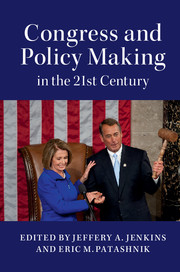Book contents
- Frontmatter
- Contents
- List of Figures
- List of Tables
- List of Contributors
- Acknowledgments
- 1 The Evolving Textbook Congress: Polarization and Policy Making on Capitol Hill in the 21st Century
- PART I CONGRESSIONAL POLICY MAKING IN A POLARIZED AGE
- PART II CONGRESS AND SOCIETY
- 4 Making a Rainbow Military: Parliamentary Skill and the Repeal of “Don't Ask, Don't Tell”
- 5 Who Votes for Inequality?
- PART III CONGRESS AND ECONOMIC POLICY
- PART IV CONGRESS AND DOMESTIC POLICY DILEMMAS
- PART V REFLECTIONS
- Index
- References
5 - Who Votes for Inequality?
from PART II - CONGRESS AND SOCIETY
Published online by Cambridge University Press: 05 February 2016
- Frontmatter
- Contents
- List of Figures
- List of Tables
- List of Contributors
- Acknowledgments
- 1 The Evolving Textbook Congress: Polarization and Policy Making on Capitol Hill in the 21st Century
- PART I CONGRESSIONAL POLICY MAKING IN A POLARIZED AGE
- PART II CONGRESS AND SOCIETY
- 4 Making a Rainbow Military: Parliamentary Skill and the Repeal of “Don't Ask, Don't Tell”
- 5 Who Votes for Inequality?
- PART III CONGRESS AND ECONOMIC POLICY
- PART IV CONGRESS AND DOMESTIC POLICY DILEMMAS
- PART V REFLECTIONS
- Index
- References
Summary
In an age of soaring economic inequality, what good is our Congress? Should we expect law makers to push back against the economic and social changes that are driving wealth into fewer and fewer hands? Or do legislators have incentives to let the broadly shared prosperity America enjoyed a half century ago become the stuff of history books?
Over the last four decades, economic inequality in the United States has grown to levels not seen since the start of the last century (for useful reviews, see Bartels 2008, ch. 1; Jacobs and Skocpol 2005; Kelly 2009, ch. 1). From the 1940s to the 1970s, the incomes of the rich and the poor grew by roughly the same amount. From the 1970s on, however, the vast majority of Americans have endured tepid income growth, while the richest have enjoyed astronomical economic fortunes. Figure 5.1 plots Piketty and Saez's (2003) well-known data on the percentage of income earned by the richest 1 percent of Americans. The mid-20th-century decades of shared prosperity are over. Today, we live in what Bartels (2008) has aptly termed the New Gilded Age.
There are good reasons to be concerned about how unequal America has become: economic inequality usually spells trouble. Although we might disagree about how much inequality is “right” in some moral or normative sense, scholars who study inequality have consistently found that more unequal places are worse off on a host of objective measures of well-being. Cross-nationally, countries that are more unequal tend to have higher rates of obesity, mental illness, homicide, teen pregnancy, incarceration, drug use, and social fragmentation (for another useful review, see Wilkinson and Pickett 2011). Of course, it is difficult to know which way the causal arrow runs – economic inequality might cause other social problems, or widespread social problems might make societies more economically unequal (or both). Either way, at best inequality is a symptom of a larger illness; at worst, it is the disease itself. Our New Gilded Age is a serious red flag, a warning sign that our social fabric is fraying in ways that could have far-reaching consequences for the well-being of American society.
How has our legislative branch responded to accelerating inequality? For the most part, it hasn't done much to step on the brakes.
- Type
- Chapter
- Information
- Congress and Policy Making in the 21st Century , pp. 106 - 134Publisher: Cambridge University PressPrint publication year: 2016
References
- 2
- Cited by



